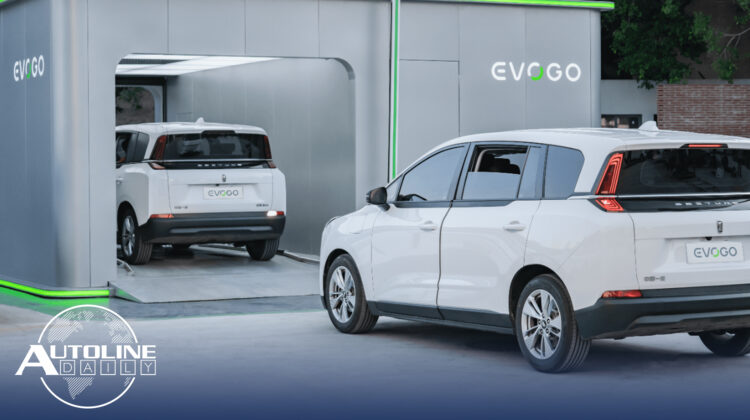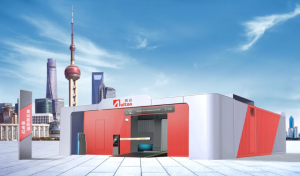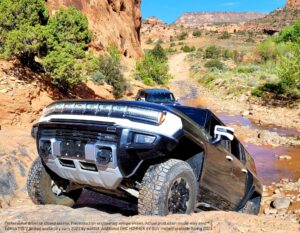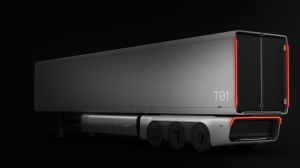
Listen to “AD #3330 – Battery Swapping Hits Tipping Point in China; Lucid Says Rivian Needs to Raise Prices; Two Neat Features on Niro EV” on Spreaker.
Follow us on social media:
Runtime: 11:22
0:08 Lucid Says Rivian Needs to Raise Prices
1:05 BMW Seeks Alternatives to Russian Gas
1:46 Auto Suppliers Rate Stellantis Poorly
2:48 American Axle Denies It’s Up for Sale
4:07 Battery Swapping Hits Tipping Point in China
5:02 BYD To Launch Super Lux Brand
5:32 Hummer SUV Turns Tighter Than Honda Civic
6:13 Einride Semi Trailer for EV Power
7:06 Average U.S. Car Now 12.2 Years Old
8:25 Two Neat Features on Kia Niro EV
Visit our sponsors to thank them for their support of Autoline Daily: Bridgestone, Intrepid Control Systems, MEDC and Schaeffler.
This is Autoline Daily, the show dedicated to enthusiasts of the global automotive industry.
LUCID SAYS RIVIAN NEEDS TO RAISE PRICES
Earlier this year, Rivian raised the prices on its truck and SUV by $10,000 to $12,000. The electric pickup starts at $67,500, while the SUV is $72,500. But Peter Rawlinson, the CEO of Lucid, says Rivian will lose money at those prices. He says Rivian would have to charge $95,000 to make a profit on its vehicles. Rawlinson told Reuters that Rivian is probably paying about $22,000 for its battery packs from Samsung SDI, and $20,000 for its drive trains from Bosch. Rivian says it’s working to lower its costs. It’s developing a lower cost electric motor that it will make in-house, and it’s also going to start offering lower cost LFP or lithium iron phosphate batteries.
BMW SEEKS ALTERNATIVES TO RUSSIAN GAS
Germany relies heavily on natural gas from Russia but now the auto industry is concerned about that supply being cut off because of embargoes. Automakers account for around 37% of natural gas consumption in Germany. So, the industry is looking for alternative sources of energy as well as a system to ration natural gas supplies if imports are halted. BMW said it’s exploring new investments in hydrogen, solar and geothermal energy to lessen its dependence on natural gas and said an embargo would bring the industry to a standstill.
AUTO SUPPLIERS RATE STELLANTIS POORLY
Automotive suppliers like working with Toyota and Honda, they have issues with GM and Ford, and they really don’t like dealing with Nissan or Stellantis. Especially Stellantis. Those are the results of the annual supplier study that’s conducted by Plante Moran. It surveys supplier executives and purchasing agents about how they rate the 6 top auto manufacturers in North America. The study dives into specific purchasing areas, from raw materials to chassis components as well as EV powertrains. And it measures automakers on things like how well they communicate with suppliers, collaborate on engineering, or resolve issues on timely payments for tooling. As we reported last week, things got so bad between Stellantis and its suppliers that the automaker had to replace its head of Purchasing, and it had to back off on the new terms and conditions it added to supplier contracts.
AMERICAN AXLE DENIES IT’S UP FOR SALE
Auto supplier American Axle denies it’s up for sale. Bloomberg reported that it’s in talks to sell the company. But Axle issued a statement saying it normally doesn’t comment on “market rumors and speculation” but it felt it was “important to clarify that we are not engaged in a process to sell the company.” So why is this story getting so much attention? Because EVs don’t need as many drive shafts or prop shafts as ICE vehicles. And so the companies, like American Axle, that make these components, have got to figure out how they’re going to make the transition, or maybe even put themselves up for sale.
BATTERY SWAPPING HITS TIPPING POINT IN CHINA
Looks like battery swapping is about to hit the tipping point in China. NIO is the leader and has 900 battery swapping stations. Another leader is Aulton, which mainly swaps batteries for taxi and ride-hailing vehicles. It also has partnerships with FAW, BAIC, GAC, Changan and Dongfeng, to co-develop 24 battery swappable models. And more companies have opened battery swapping stations, including battery maker CATL. Geely plans to open 5,000 stations by 2025. And GAC aims to build 1,000 battery swapping locations by 2025. If battery swapping really proves popular in China, it could force all automakers who sell cars there to design their EVs and battery packs so they can be swapped.
BYD TO LAUNCH SUPER LUX BRAND
And sticking with the Chinese market, BYD is planning to go more upscale with a new premium brand that will make its debut in the third quarter of the year. The first model will be an off-road looking vehicle that will be unveiled in the fourth quarter of 2022 and go on sale in the first half of next year. And the vehicles are going to be pricey, they’ll range from $120,000 to $225,000.
HUMMER SUV TURNS TIGHTER THAN HONDA CIVIC
GM President, Mark Reuss revealed on his LinkedIn page that the GMC team was just in Moab, Utah doing final testing and validation work on the Hummer EV SUV. Thanks to a shorter wheelbase it has even better off-road figures compared to the truck. It has an impressive departure angle of 49-degrees and with 4-wheel steering a turning circle of just 35.4 feet. To put that in perspective, the Hummer SUV can turn tighter than a Honda Civic. Production of GM’s self-titled “Supertruck” starts early next year.
EINRIDE SEMI TRAILER FOR EV POWER
Swedish transportation company Einride unveiled a new trailer for semi-trucks that incorporates the batteries for electric drive. The somewhat futuristic-looking trailer features 320-kWh worth of batteries, which Einride says will provide up to 650 kilometers or about 400 miles of range. Although, it makes no mentions of motors, so all of the power must come from the tractor. Not only do Einride’s own electric and autonomous trucks hook up to it, but the trailer is also compatible with other electric semis. As well as its digital app, which allows users access to even more information, like additional routing, cargo weight and range. Production of pilot trailers for testing is expected to be completed next year.
AVERAGE US CAR NOW 12.2 YEARS OLD
We’re all getting older, and so are the vehicles we drive. In fact, vehicles in the U.S. are now the oldest that they’ve ever been. According to a report from S&P Global, the average American vehicle is now 12.2 years old, a record, and an increase of about 2 months. Prices for new and used vehicles keep going up and inventories keep going down, so consumers keep holding on to the cars that they’ve got.
TWO NEAT FEATURES ON KIA NIRO EV
If you follow electric cars, you’re probably up to speed on the basic specs of the all-new Niro EV. But John got to get a close up look at the car and found two features that really got his attention. Take a look.
(The Kia Niro EV features is only in the video version of today’s show.)
The new Niro will go into production in South Korea later this summer.
But that’s a wrap for today’s show. Thanks for making Autoline a part of your day.
Thanks to our partner for embedding Autoline Daily on its website: WardsAuto.com
Seamus and Sean McElroy cover the latest news in the automotive industry for Autoline Daily.









